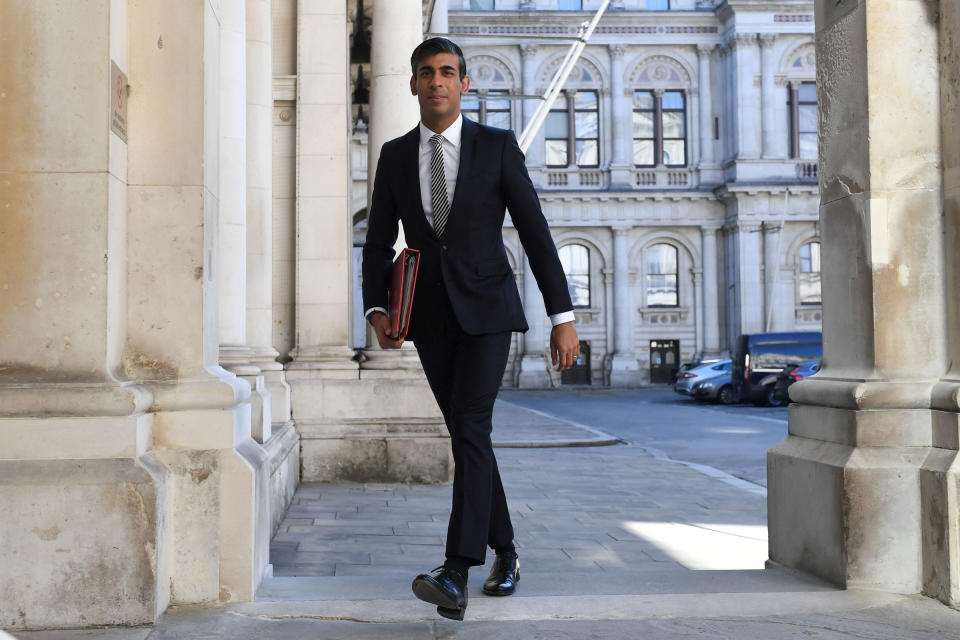Coronavirus: UK government unveils 'Winter Economy Plan' to protect jobs and firms

The UK chancellor Rishi Sunak has unveiled a “radical” new package of support for the UK economy, including new income grant schemes, more business loan funds and hospitality tax cuts.
Sunak set out a string of contingency plans on Thursday to urgently shore up the economy with both infection rates and job losses rising.
Millions of workers are likely to be affected by the government’s “Winter Economy Plan,” with the new measures unveiled by the finance minister in parliament including:
A six-month “job support scheme” from November, with wage subsidies for workers in “viable” jobs, as long as they work and are paid as normal for at least a third of their usual hours. For hours not worked, workers face a pay cut of a third, but the government and employer will cover another third each.
Tighter rules on firms claiming taxpayer wage subsidies, excluding large firms who have seen revenues rise, and stopping firms making workers on the scheme redundant or making certain payments to shareholders.
New grants for self-employed workers until 30 April next year, but covering only 20% of average monthly trading profits for those facing reduced demand over the winter.
An extension of UK government business loan schemes, managed by banks, as the coronavirus crisis continues to wreak havoc for firms. Bounce back loans can be extended from six to 10 years, the coronavirus business interruption loan schemes (CBILs) guarantee will also rise to 10 years, and application deadlines will be extended for all four major schemes to 30 November.
Extended tax cuts for hospitality, hotels, holiday accommodation and some attractions, with a temporary 5% rate now due to expire on 31 March rather than mid-January.
Allowing firms to pay deferred VAT taxes due in March over 11 smaller repayments, without interest.
An extension of the deadline for tax payments by self-employed and others who use income tax self-assessment and “need extra help” over 12 months from next January.
From 1 November, for the next six months, the Job Support Scheme will protect viable jobs in businesses who are facing lower demand over the winter months due to Covid-19. pic.twitter.com/8NpIKpQV8y
— HM Treasury (@hmtreasury) September 24, 2020
Sunak said there were reasons to be “optimistic” despite firms’ woes given three months of GDP growth, but acknowledged the resurgent virus posed a “threat to this fragile economic recovery.”
He defended replacing the furlough scheme, saying there was “no harder choice” than to end the scheme but said he was supporting “viable” jobs through the new measures.
“Our economy is now likely to undergo a more permanent adjustment,” he warned. “The sources of our economic growth and the kind of job we create will adapt and evolve to the new normal. And our plan needs to adapt and evolve in response.
“It is fundamentally wrong to hold people in jobs that only exist inside the furlough.”
Sunak also told MPs: “I cannot save every business. I cannot save every job. No chancellor could.”
He had faced a clamour from firms, unions and Labour to extend or replace the furlough scheme, currently safeguarding around 12% of jobs. Shadow chancellor Anneliese Dodds questioned why new policies had not been announced earlier, saying her calls had been “rebuffed by the government 20 times” and firms had been making redundancies.
Germany, France, and other European economies have already introduced similar measures to the new wage subsidy scheme.
READ MORE: Pubs and city centre firms warn new coronavirus rules could be ‘fatal blow’
The new UK job support scheme will see employees working a third of their hours, taking home 77% of their pay, according to the Treasury. “These are radical interventions in the UK labour market, policies we have never tried in this country before,” added Sunak.
The chancellor had faced fresh pressure to act swiftly in recent weeks as UK coronavirus cases have leapt, more regional lockdowns and now tighter national restrictions have been imposed.
“No-one wanted to be in this situation but we need to respond to it,” a Treasury source told Yahoo Finance UK ahead of the announcement. Officials are understood to have been weighing up trade-offs between short-term protection measures and efforts to rebuild the economy long-term, and between protecting existing jobs and providing more support finding new ones.
Business chiefs warned millions of jobs and many firms’ survival was at stake earlier this week after prime minister Boris Johnson and the leaders of devolved administrations announced tougher restrictions.
The Confederation of British Industry’s director-general warned measures including a 10pm shutdown for hospitality firms and encouraging home-working would be a “crushing blow” for thousands of companies. She had called for a “successor” for the job protection scheme.

 Yahoo Finance
Yahoo Finance 